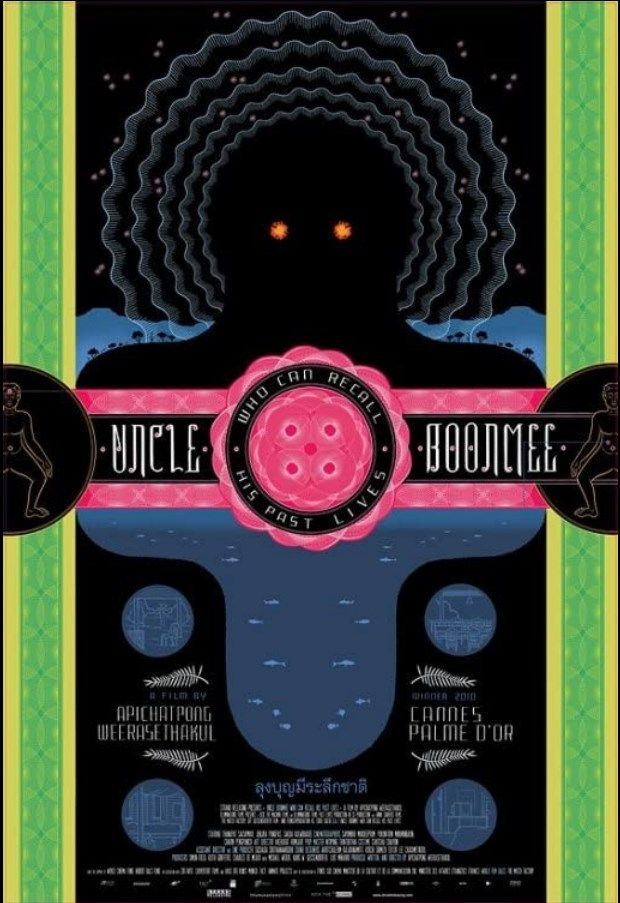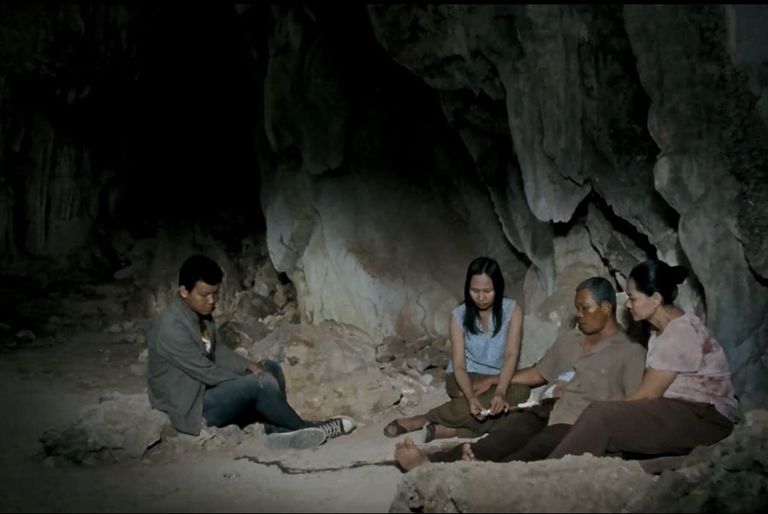
Uncle Boonmee Remembering Past Lives is a Thai film, dealing with the complex subject of reincarnation, a rare blend of physical and metaphysical reality from 2010, written and directed by Apichatpong Weerasethakul and winner of the Palme d'Or at the Cannes Film Festival that year.
The film is allegedly based on a true story.
Apichatpong Weerasethakul, the director, said that the plot of the film was based on a story told in a book published by an unknown abbot belonging to a Buddhist temple in the Phra Sripariyattiweti region.
Apparently this abbot had collected in a book the stories of a man named Boonmie who had come to the temple one day and told him that he could perfectly remember his previous lives while meditating.
Impressed by the story the abbot wrote a book in 1983 and by the time the book reached Apichatpong the author of the story had died.
In any case, the inspiration had already led Apichatpong to prepare the film project.

The film opens with the allegorical image of a domestic buffalo (used to carry out work on Thai farms and fields) which, after breaking the noose tying it to a tree, wanders moaning through the misty, nocturnal Thai savannah, until it meets a man who invites it to follow him and allows itself to be led meekly to its destination.
This somewhat surreal image is followed by a much more real and trivially domestic one: Uncle Boonmee, the story's protagonist, is a wealthy Thai landowner (albeit a small one) who suffers from kidney stones and spends his last days in the countryside in a strictly family environment with Jai, a Laotian immigrant who cares for him, and his sister-in-law Jen and her son, Thong, who have just arrived from the city for a visit.
The theme of the reincarnation of departed ancestors is introduced when they are all dining together on the farmhouse porch in the heat and the ghosts of his wife Huay, who died 19 years ago, and his long-lost son, who has now taken the form of a large semi-human ape with phosphorescent red eyes, appear.
These apparitions are not really terrifying at all. They speak to the living, i.e. the diners, interrogate them, and are in turn interrogated by them.
The director's idea is to show that nothing ends with death. Those people who leave earthly life as human beings are reincarnated in animal or vegetable forms in a kind of continuous cycle that never ends.
Some of the film's dialogues are not only metaphorical but also remarkably profound. For example when the deceased wife says to Boonmee: "Paradise is overrated, there is nothing there".
Uncle Boonmee realises that, in reality, these paritions mean that he too is about to die. And he must prepare himself for the great journey.
A night journey in which he will be led through a forest full of fantastic sounds and apparitions to finally reach a cave that represents the womb where he will die to be reborn.
There are fantastic evocations such as the natural environment of uncontaminated beauty in which a princess with a disfigured face mates with a catfish in a lake fed by a waterfall as an inseparable union of the different elements of nature with each other.
Like Uncle Boonmie's last thought before he died: "in front of the forest, the hills and the valleys my past lives, as an animal or another being, emerge before me".

Thanapat Saisaymar as Boonmee
Jenjira Pongpas as Jen
Sakda Kaewbuadee as Tanga
Natthakarn Aphaiwong as Huay, esposa de Boonmee
Jeerasak Kulhong as Boonsong, hijo de Boonmee
Kanokporn Thongaram as Roong, amigo de Jen
Samud Kugasang as Jai

El Tío Boonmee Que Recuerda Vidas Pasadas es una película tailandesa, que trata el complejo tema de la reencarnación, rara mezcla de realidad física y metafísica del año 2010, escrita y dirigida por Apichatpong Weerasethakul y ganadora de la Palma de Oro del Festival de Cannes de ese año.
La película se basa presuntamente en una historia real.
Apichatpong Weerasethakul, el director, contó que el argumento de la película se basaba en la historia contada en un libro publicado por un abad desconocido pertenciente a un templo budista en la región de Phra Sripariyattiweti.
Aparentemente este abad habría recogido en un libro los relatos de un hombre llamado Boonmie que un dia se había acercado al templo diciéndole que podía recordar perfectamente sus vidas anteriores mientras meditaba.
Impresionado por el relato el abad escribió un libro en 1983 y cuando el libro llegó a las manos de Apichatpong el autor del relato ya había muerto.
De cualquier manera la inspiración ya había llevado a Apichatpong a preparar el proyecto de la película.

La película inicia con la imagen alegórica de un búfalo doméstico (usado para desarrollar trabajos en las granjas y campos thailandeses) que, tras romper el lazo que lo ataba a un árbol, vaga gimiendo por la neblinosa y nocturna sabana thailandesa, hasta que encuentra un hombre que lo invita a seguirla y se deja guiar mansamente a su destino.
A esta imagen algo surrealista se sucede una mucho más real y d euna trivialidad doméstica: el tío Boonmee protagonista de la historia es un rico terrateniente thailandés (aunque su propiedad es pequeña) que sufre de cálculos renales y pasa sus últimos días de vida en el campo en un ambiente estrictamente familiar junto a Jai, un inmigrante laosiano que lo cuida, y con su cuñada Jen y su hijo, Thong, que acaban de llegar de visita desde la ciudad.
El tema de la reencarnación de los antepasados defuntos se presenta cuando está cenando todos juntos en el porche de la granja debido al calor reinante y aparecen los fantasma de su esposa Huay, fallecida hace 19 años, y de su hijo, desaparecido hace tiempo y que ahora ha adoptado la forma de un gran simio semihumano con ojos rojos fosforescentes.
Estas apariciones en realidad no tienen nada de terroríficas. hablan a los vivos, es decir a los comensales, los interrogan, son interogados a su vez por ellos.
La idea del director es demostrar que nada se termina con la muerte. Esas personas que dejan la vida terrenal como seres humanos se reencarnan bajo formas animales o vegetales en una especie de ciclo continuo que no termina nunca.
Hay algunos diólos de la película no solo metafóricos sino de una profundidad notable. Por ejemplo cuando la esposa difunta le dice a Boonmee: "El paraíso está sobrevalorado, allí no hay nada".
Tio Boonmee se da cuenta que, en realidad, estas pariciones significan que también él estó por morir. Y se debe preparar para el gran viaje.
Un viaje nocturno en el que lo conducirán a través de un bosque lleno de sonidos y apariciones fantásticas para llegar finalmente a una cueva que representa el útero donde morirá para renacer.
Hay evocaciones fantásticas como el entorno natural de belleza incontaminada en el cuál se aparean una princesa de rostro desfigurado con un pez gato en un lago alimentado por una cascada como una unión inseparable de los distintos elementos de la naturaleza entre sí.
Como el último pensamiento del tio Boonmie antes de morir: "frente a la selva, las colinas y los valles mis vidas pasadas, como animal u otro ser, emergen ante mí".

Thanapat Saisaymar como Boonmee
Jenjira Pongpas como Jen
Sakda Kaewbuadee como Tanga
Natthakarn Aphaiwong como Huay, esposa de Boonmee
Jeerasak Kulhong como Boonsong, hijo de Boonmee
Kanokporn Thongaram como Roong, amigo de Jen
Samud Kugasang como Jai

Source banner divider / Fuente banner separador: Pngegg.
Greetings,
Also, keep in touch with Blurtconnect-ng family on Telegramand Whatsapp
Peace
Thank you for supporting and voting my content @blurtconnect-ng.